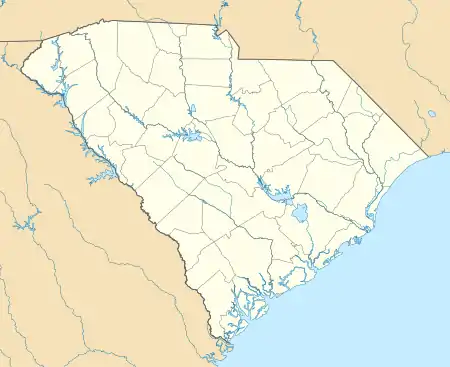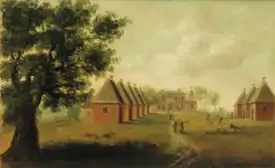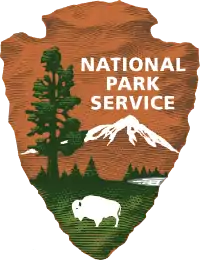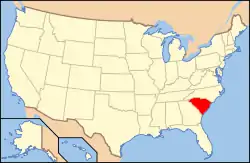Mulberry Plantation (Moncks Corner, South Carolina)
Mulberry Plantation is a historic plantation property in rural Berkeley County, South Carolina. Located between Moncks Corner and Charleston, this property was developed in 1714 by Thomas Broughton, who became the Royal governor of South Carolina, and is one of the oldest plantation homes in the United States. Its rice fields, dikes and canals were well-preserved into the 20th century. The plantation house and ten surrounding acres were declared a National Historic Landmark in 1963.[2][3][4]
Mulberry Plantation | |
.jpg.webp) Mulberry Plantation, 1970s HABS photo | |
  | |
| Location | Off Old U.S. 52 on Cooper River, Moncks Corner, South Carolina |
|---|---|
| Coordinates | 33°8′31″N 80°1′4″W |
| Area | 10 acres (4.0 ha) |
| Built | 1714 |
| Architectural style | Colonial, Georgian |
| NRHP reference No. | 66000697 |
| Significant dates | |
| Added to NRHP | October 15, 1966[1] |
| Designated NHL | October 9, 1960[2] |
Description and history
Mulberry Plantation is set on the southern shore of the Cooper River, between it and Old United States Route 52. The main house is a two-story brick building, with a gambrel roof. At each corner of the main block stand engaged single-story square pavilions, topped by pyramidal roofs. The main entrance is sheltered by a gabled portico.[3]
The plantation was probably established around 1714, but may not have been founded until 1725, and was built in what was at the time a frontier area on the site of a fortification for defense against Native American attack. This plantation was used as a defensive site during the Yamasee War (1715–17). The plantation house is a rare little-altered example of high-style early Georgian architecture in the nation.[3]

Lawrence A. Walker of Summerville, South Carolina, bought the property in 1946 from Clarence E. Chapman of New York, and G. Everett Hoyt of Fairfield, Connecticut paid $175,000 for the house, including 1,027 acres, along with personal property in 1953.[5][6] A later owner, Charles A. Atkins, was indicted in federal court over bogus tax schemes, and he transferred the house to his wife. Atkins had himself acquired the house from Fannie H. Brawley and William J. Iselin for $2,300,565.[7] The Historic Foundation of Charleston bought the 800-acre plantation in August 1987 to prevent its possible development. The Foundation paid $2,800,000, and resold the property for $2,550,000 in August 1988 to S. Parker Gilbert, a New York City investment banker, and his wife.[8] The Foundation expanded its pre-existing easements on the property to prevent any subdivisions of the property, protect a two-mile entry road, and preserve the interior of the house.[9]
See also
| Wikimedia Commons has media related to Mulberry Plantation (Moncks Corner, South Carolina). |
References
- "National Register Information System". National Register of Historic Places. National Park Service. July 9, 2010.
- "Mulberry Plantation". National Historic Landmark summary listing. National Park Service. Archived from the original on 2011-06-06. Retrieved 2008-03-09.
- James Dillon (1984). "National Register of Historic Places Inventory-Nomination: Mulberry Plantation" (pdf). National Park Service. Cite journal requires
|journal=(help) and Accompanying three photos, exterior and view, from 1958, 1969, and undated (32 KB) - "Plantation Becomes National Landmark". Charleston News & Courier. March 29, 1963. pp. 11A. Retrieved October 14, 2013.
- "Connecticut Man Buys Plantation for $175,000". Charleston News & Courier. Feb 11, 1953. pp. 3A. Retrieved October 14, 2013.
- "Plantation Sold for Over $150,000". Meriden Record. Feb 11, 1953. p. 7. Retrieved October 14, 2013.
- Pooser, Claire (July 18, 1987). "Foundation to purchase Berkeley plantation". Charleston News & Courier. pp. B1. Retrieved October 14, 2013.
- Pooser, Charles (Aug 25, 1988). "N.Y. Investment Banker, Wife Buy Mulberry for $2,550,000". Charleston News & Courier. pp. B1. Retrieved October 14, 2013.
- Pooser, Claire (Dec 20, 1988). "Restrictions Will Protect Mulberry". Charleston News & Courier. pp. 9B. Retrieved October 14, 2013.
External links
- "Slave Houses, Mulberry Plantation, South Carolina, ca. 1800", Slavery Images: A Visual Record of the African Slave Trade and Slave Life in the Early African Diaspora
- Mulberry Plantation, Berkeley County (off U.S. Hwy. 52, Moncks Corner vicinity), at South Carolina Department of Archives and History
- Mulberry Plantation, within NPS online book
- U.S. Geological Survey Geographic Names Information System: Mulberry Plantation (Moncks Corner, South Carolina)

